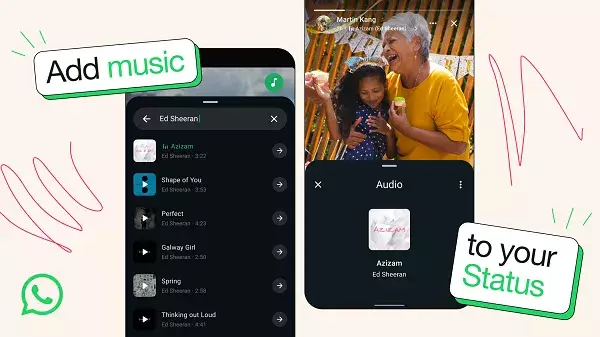In an era where social sharing is profoundly shaped by audiovisual elements, WhatsApp is stepping up its game with the introduction of a music-sharing feature for Status updates. This not-so-surprising development signals the app’s intention to enhance user engagement by allowing individuals to infuse emotional depth into their narratives through music. The feature’s mechanics are user-friendly: a simple tap on a music note icon during the Status creation process opens up a vast library of tunes, covering everything from chart-toppers to lesser-known gems. The ability to select specific song segments offers users a unique opportunity to tailor their updates with precision, making moments more memorable through sound.
Drawing Parallels to Competing Platforms
WhatsApp’s new functionality inevitably bears resemblance to the popular music-sharing features on Instagram and Facebook Stories. However, it’s crucial to recognize the unique position WhatsApp occupies in the digital communication landscape. As the most widely used messaging application worldwide, the introduction of music sharing could create a more intimate connection between users. Unlike Instagram’s focus on curated aesthetics and public engagement, WhatsApp thrives in personal interactions. By integrating music into Status updates, WhatsApp effectively merges the personal and the expressive, allowing users to encapsulate feelings and moments in a manner that is distinctly their own.
The Strategic Move by Meta
This update is more than just an enhancement; it’s a strategic maneuver by Meta to bolster its suite of apps against burgeoning competitors like TikTok. In this fiercely contested space, music has emerged as a critical driver of engagement. With TikTok’s unpredictable standing in the U.S. market, Meta’s emphasis on music-related features could serve as a lifebuoy. It’s not merely about keeping up; it’s about positioning themselves as essential platforms for musical engagement. By enhancing the music capabilities across their ecosystem, including Instagram and now WhatsApp, Meta is devising a robust framework to keep users engaged, entertained, and creatively inspired.
A New Avenue for User Expression
The addition of music to WhatsApp Status updates empowers users to express themselves richly and vividly. The capacity to choose snippets of songs that resonate with personal experiences will likely prompt more vibrant storytelling and engagement. This could lead to a cultural shift where users begin to pay more attention to what music accompanies their updates, fostering a deeper sense of connection among friends and family. It’s an opportunity to celebrate shared memories through the universal language of music, which can transcend barriers and create bonds that text alone may fail to forge.
Confronting Future Challenges
However, introducing such features comes with its set of challenges. As WhatsApp attempts to carve a niche in the competition while maintaining its core identity, users may wonder about the fine line between personal dialogue and commercial branding. The risk lies in over-commercialization; if the music sharing experience becomes inundated with advertisements or limited access, it could backfire. WhatsApp must ensure that the joy of musical sharing doesn’t get overshadowed by potential negative user experiences.
WhatsApp’s foray into music content sharing certainly raises the bar not only for itself but for the messaging app industry as a whole. In an increasingly interconnected world where personal narratives are intertwined with digital interactions, this new feature brings exciting prospects for enriching our engagements. As we explore these developments, it becomes vital to remain vigilant about the balance between creative expression and user experience.

